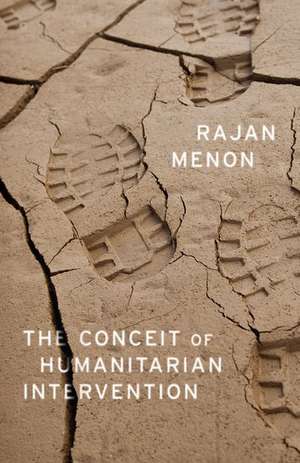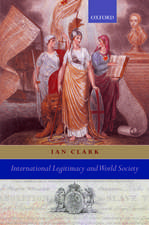The Conceit of Humanitarian Intervention
Autor Rajan Menonen Limba Engleză Paperback – 15 mar 2018
| Toate formatele și edițiile | Preț | Express |
|---|---|---|
| Paperback (1) | 159.89 lei 31-37 zile | |
| Oxford University Press – 15 mar 2018 | 159.89 lei 31-37 zile | |
| Hardback (1) | 216.26 lei 31-37 zile | |
| Oxford University Press – 28 apr 2016 | 216.26 lei 31-37 zile |
Preț: 159.89 lei
Preț vechi: 194.44 lei
-18% Nou
Puncte Express: 240
Preț estimativ în valută:
30.59€ • 31.95$ • 25.26£
30.59€ • 31.95$ • 25.26£
Carte tipărită la comandă
Livrare economică 04-10 aprilie
Preluare comenzi: 021 569.72.76
Specificații
ISBN-13: 9780190692186
ISBN-10: 0190692189
Pagini: 256
Dimensiuni: 145 x 213 x 18 mm
Greutate: 0.36 kg
Editura: Oxford University Press
Colecția OUP USA
Locul publicării:New York, United States
ISBN-10: 0190692189
Pagini: 256
Dimensiuni: 145 x 213 x 18 mm
Greutate: 0.36 kg
Editura: Oxford University Press
Colecția OUP USA
Locul publicării:New York, United States
Recenzii
Menon brilliantly explicates the several fallacies of the interventionists, while at the same time keeping the door open for intervention in reaction to atrocities when geopolitical forces are effectively aligned and the likely costs realistically taken into account.
Menon's main point is that states have not changed their foreign policies since the Cold War. The primary determinant, he says, is whether intervention serves the states' interests. This explains, for instance, why the US intervened in Kosovo but not Syria. Although not a scholarly analysis of humanitarian intervention, the book is recommended as an accessible introduction to an important international relations issue.
Menon has written a very smart book that shows the difficulty of getting countries to engage in humanitarian interventions, much less do them right. He also makes clear that the advocates of intervention do not lack for hubris, but do lack an understanding of the limits of the enterprise. Sadly, this sobering book leaves us with little hope that the so-called international community can do much to prevent the mass slaughter of innocent people."
It's hard to imagine a more complete demolition of the idea that there is, or should be, a legal norm in favor of humanitarian military intervention to stop atrocities. The only relevant law is, as Menon demonstrates, the law of unintended consequences."
This is an immensely admirable book - concise, lucid, and above all tough-minded. Proponents of humanitarian intervention will find Rajan Menon's stinging critique discomfiting - which is precisely why it merits their considered attention."
There is such a thing as a problem - even a "problem from hell" - to which there is no solution. In showing that outrage against bloody atrocity almost never justifies a military response, Rajan Menon achieves the best available critique of humanitarian intervention ever written. Careful, dispassionate, and methodical, The Conceit of Intervention is most of all a debate with those who would wish away tragedy - especially the tragedy of lacking solutions, even when the problem is compelling - in the persistently self-interested domain of international affairs. A must-read."
Richly documented and persuasive...The Conceit of Humanitarian Intervention is an excellent guide for policy-makers, and for anyone participating in the policy discussion, the next time a situation arises in which talk begins about using military force to save lives."
[This] book serves as a sharp shot across the bow to those who urge the further entrenchment of - and who believe in the inevitability of - a deep, consistent policy of humanitarian intervention in all situations of mass atrocities."
Menon's main point is that states have not changed their foreign policies since the Cold War. The primary determinant, he says, is whether intervention serves the states' interests. This explains, for instance, why the US intervened in Kosovo but not Syria. Although not a scholarly analysis of humanitarian intervention, the book is recommended as an accessible introduction to an important international relations issue.
Menon has written a very smart book that shows the difficulty of getting countries to engage in humanitarian interventions, much less do them right. He also makes clear that the advocates of intervention do not lack for hubris, but do lack an understanding of the limits of the enterprise. Sadly, this sobering book leaves us with little hope that the so-called international community can do much to prevent the mass slaughter of innocent people."
It's hard to imagine a more complete demolition of the idea that there is, or should be, a legal norm in favor of humanitarian military intervention to stop atrocities. The only relevant law is, as Menon demonstrates, the law of unintended consequences."
This is an immensely admirable book - concise, lucid, and above all tough-minded. Proponents of humanitarian intervention will find Rajan Menon's stinging critique discomfiting - which is precisely why it merits their considered attention."
There is such a thing as a problem - even a "problem from hell" - to which there is no solution. In showing that outrage against bloody atrocity almost never justifies a military response, Rajan Menon achieves the best available critique of humanitarian intervention ever written. Careful, dispassionate, and methodical, The Conceit of Intervention is most of all a debate with those who would wish away tragedy - especially the tragedy of lacking solutions, even when the problem is compelling - in the persistently self-interested domain of international affairs. A must-read."
Richly documented and persuasive...The Conceit of Humanitarian Intervention is an excellent guide for policy-makers, and for anyone participating in the policy discussion, the next time a situation arises in which talk begins about using military force to save lives."
[This] book serves as a sharp shot across the bow to those who urge the further entrenchment of - and who believe in the inevitability of - a deep, consistent policy of humanitarian intervention in all situations of mass atrocities."
Notă biografică
Rajan Menon is the Anne and Bernard Spitzer Professor of Political Science, City College of New York/City University of New York, and a Senior Research Scholar, Saltzman Institute of War and Peace Studies, Columbia University. His most recent book, co-authored with Eugene B. Rumer, is Conflict in Ukraine: The Unwinding of the Post-Cold War Order (MIT Press, 2015). His most recent book for Oxford University Press, The End of Alliances, was published in 2007 and was named by the American Library Association as an Outstanding Academic Title for that year.














